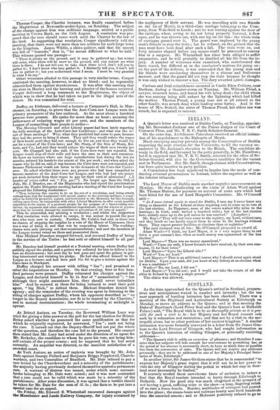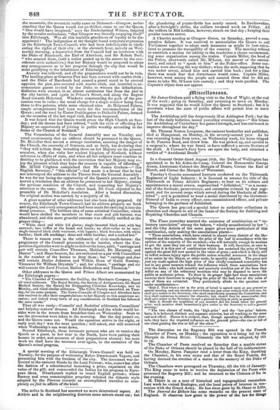SCOTLAND.
As the time approached for the Queen's arrival in Scotland, preps's- fives and anticipations waxed in number and intensity ; but the too near approach of bustling intrusion has been checked. There was a meeting of the Highland and Agricultural Society at Edinburgh on Monday, to move an address to the Queen ; and at that meeting the Duke of Bucclench (Lord Privy Seal and the Queen's host at Dalkeith Palace) said, "The Royal visit is to be as thoroughly private as it is pos- sible for such a visit to be : her Majesty and her Royal consort only seek by it relaxation and recreation; and that not by a visit to the me- tropolis alone, but to other portions of her ancient kingdom." A similar intimation was more formally conveyed in a letter from Sir James Gra- ham to the Lord Provost of Glasgow, who had sought information as to the Queen's intention of visiting Glasgow, or personally receiving addresses- " The Queen's visit is solely an excursion of pleasure; and therefore I con- ceive that her subjects will best consult her convenience by permitting her, as the period of her absence is necessarily short, to have as much time as possible free from the ceremonies of state. The Queen will not receive any addresses personally: they are to be addressed to one of her Majesty's Principal Secre- taries of State, Edinburgh."
In another letter, Sir James Graham states that he is commanded "to express her Majesty's great regret that it will not be in her power to visit the city of Glasgow during the period to which her stay in Scot- land must necessarily be limited." It scarcely needed these unwelcome hints of seclusion to induce a fear that the Royal tourists intended to hurry through Edinburgh to Dalkeith. Now the good city was much chagrined at the prospect of not having a good, sufficing stare at the show—a long, lingering relish of so rare a bonne bouche. Besides, multitudes of strangers had poured into the place; the steam-boats and railways hourly sent forth hundreds into the crowded streets ; and as Mahomet positively refused to go to
the mountain, the mountain really came to Mahomet—Glasgow, under- standing that the Queen would not go thither, came to see the Queen. "One would have imagined," says the Ecclesiastical Witness, inspired by the secular enthusiasm, "that Glasgow was literally emptying itself" into Edinburgh. Was all this laudable greediness of loyalty to be dis- appointed The indignation at the thought found corporate expression in the Edinburgh Town-Council, who had been indefatigable in vindi- cating the rights of their city : at the eleventh hour, namely on Wed- nesday morning, a deputation from the Council had an interview with the Duke of Buccleuch, the Earl of Aberdeen, and Sir Robert Peel ; "who assured them, (said a notice posted up in the streets by the con- siderate civic authorities,) that her Majesty would be prepared to adopt any arrangements as to her progress through the city that would be most gratifying to the inhabitants of Edinburgh." Anxiety was relieved, and all the preparations would not be in vain. The landing-place at Granton Pier had been covered with scarlet cloth ; and the Duke of Buccleuch had caused a grand stand to be erected opposite the pier, also covered with scarlet cloth, and intended to ac- commodate guests invited by the Duke to witness the debarkation. Galleries were erected, in an almost continuous line from the pier to the city barrier, and again in Prince's Street, and along the Regent Road towards Holyrood Windows commanding the path of the pro- cession rose in value ; the usual charge for a single window being from three to five guineas, while some obtained nine. At Holyrood Palace, ample arrangements had been made for the accommodation of the Queen ; and the road by Easter Duddingston to Dalkeith Palace, formed on the occasion of the last regal visit, had been reopened.
It was hoped that the Queen would grace the High Church on Sun- day ; and the throne had been refitted, "with the view of affording her Majesty an opportunity of joining in public worship according to the forms of the Church of Scotland.'
The Commission of the General Assembly met on Tuesday, and voted unanimously that an address should be presented to the Queen. Dr. Makellar then moved a strange resolution, asserting the danger of the Church, the necessity of firmness, and so forth, but declaring that "they will refrain from intruding these on her Majesty on the present occasion, when she visits her ancient kingdom of Scotland, without reference to affairs of state, and when all her subjects must combine in desiring to be gladdened with the conviction that her Majesty may en- joy the pleasure which they hope the country is capable of affording." Mr. MGM Crighton complained that Sir James Graham—" this English Secretary," "this official "—had made it a favour that he had not intercepted the address to the Throne from the General Assembly : he was for not losing the opportunity of the Queen's presence ; and he moved a resolution that an address be presented to her Majesty, stating the perilous condition of the Church, and requesting her Majesty's attention to the same. On the other hand, Dr. Cook objected to the preamble of Dr. Makellar's resolution. After a heated discussion, the original motion was carried, by a majority of 38.
A great number of other addresses had also been duly prepared. Of -course, the Edinburgh Town-Council had its address properly set forth and signed, and every arrangement had been made for carrying it into the dread presence. The brilliant idea of some artistical Councillor, which would have clothed the members in blue coats and gilt buttons, was abandoned, and this more graceful costume was officially notified as the proper thing- " White stock and white kid gloves; single-breasted black coat, with bag annexed; lace ruffles at the breast and hands ; no shirt-collar to be seen; single-breasted black cloth waistcoat, with lappets ; black breeches, with white buckles; black silk stockings; shoes and white buckles ; and a cocked hat."
There is reason even in the arithmetic of civic coach-horses : the programme of the Council procession to the barrier, where the Cor- poration dignitaries were to alight to deliver the keys, saith, "carriage and pair will contain Councillors Thomson, Maitland, Dr. Macaulay, and Hunter "; and Mace-bearers, 8:e. are reckoned on a par with Councillors in the number of the horses to drag them : but "carriage and four will contain Bathes Johnston and Wilkie, Dean of Guild Ramsay, Treasurer Sir William Drysdale" ; and, for climax, "carriage and six will contain the Lord Provost, Bailies Richardson and Thomson."
Other addresses to the Queen and Prince Albert are enumerated by the Edinburgh papers-
" The Chamber of Commerce, the Guildry, the Merchants Company, have all voted addresses. The Royal Society, the Society of Antiquarians, the Royal Medical Society, the Society for Propagating Christian Knowledge, met on Monday, and voted similar addresses. The Celtic Society assembled on Tues- day, for the same purpose. The Town-Councils of Glasgow and Aberdeen have also resolved to offer their congratulations to her Majesty on this auspicious oc- casion; and indeed every town of any consideration in Scotland has followed the same course."
Thus all was ready—Councils' and Societies' addresses, Councillors' and holyday-makers' dresses. All Edinburgh and the whole world be-
sides were in the streets from breakfast-time on Wednesday. Seats to see the procession were taken in the morning. But the day passed on, and the Queen came not. Would the squadron arrive in the night, or early next day ? was the next question ; still asked, and still unsolved when Wednesday's sun went down.
Beyond Edinburgh, those fortunate persons who are to receive the Queen as a guest, in her tour to the North, have been putting their houses in order, and accounts of their preparations abound : but next week we shall have the accounts over again, in the narrative of the Queen's actual progress.
A special meeting of the Edinburgh Town-Council was held on Tuesday, for the purpose of welcoming Bebop Dwarkanath Tagore, and presenting him with the freedom of the city. The document was de- livered to the eminent Hindu by the Lord Provost ; who, somewhat after the fashion of a schoolmaster bestowing a prize, expatiated on the value of the gift, and commended the Indian for his progress in Euro- pean ideas. Dwarkanath replied in round English periods; whose fluency and even commonplace propriety rebuked the didactic style adopted by the Provost towards an accomplished traveller so com- pletely au fait in affairs of the kind.
The strike in Scotland has assumed no more determined aspect. At Airdrie and in the neighbouring districts some miners stand out; but the plundering of potato-fields has nearly ceased. In Renfrewshire, after a fortnight's strike, the colliers resumed work on Friday. All the colliers in Mid Lothian, however, struck on that day ; keeping their precise reasons secret.
A Chartist meeting at Glasgow Green, on Saturday, proved a com- parative failure. It was resolved to memorialize the Queen to call Parliament together to adopt such measures as might be best calcu- lated to promote the tranquillity of the country. The meeting refused to entertain a motion for adding to the resolution a clause recommend- ing some organization among the trades. Captain Miller, the head of the Police, afterwards called Mr. M`Lean, the mover of the amend- ment, and asked to "speak to him" at the Police-office. Some con- stables were showing the way thither ; when the mob, supposing that he was under arrest, seized him and carried him back ; and for a time there was much fear that disturbance would come. Captain Miller, however, went among the people and assured them that be did not mean to take Mr. M'Lean into custody ; and they were pacified. The Captain's object does not appear.



























 Previous page
Previous page